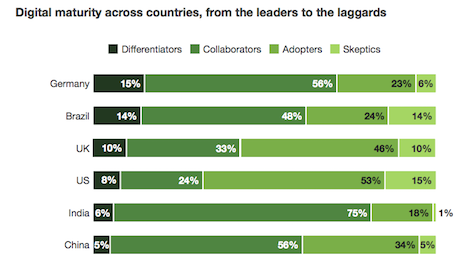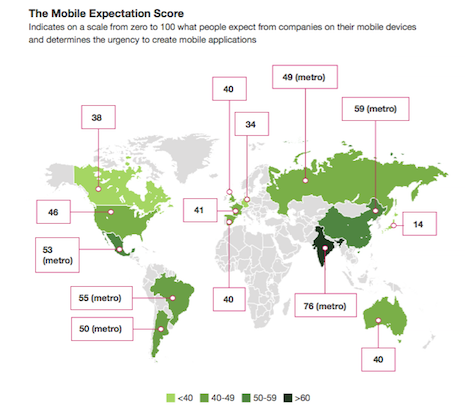 Localized content is paramount to running a global company. Image credit: McKinsey
Localized content is paramount to running a global company. Image credit: McKinsey
The digital age has afforded brands the unprecedented opportunity for global expansion, but digital immaturity can lead to embarrassing losses as companies struggle to effectively localize content. A new report from Forrester looks at the ways that brands face challenges as they expand digitally to a global audience. Forrester found that most brands tend to emphasize a homogenous, approved brand experience around the world rather than the more difficult but ultimately more effective localized content.
"Adapting your global marketing to the specificities of local countries as always been a struggle for brands and is complex to execute," said Thomas Husson, author of the report. "Digital, and especially mobile, changes the game in the sense that it increases customers’ expectations and complexifies execution.
"For marketers, it less about localizing global ad campaigns and more about delivering the experience consumers are expecting locally. For marketers to execute properly on this, it requires a broader business transformation and most brands are still not mature in evolving their culture and organization for the digital era."
Localized content Current marketers and brands have unprecedented access to customers around the world. Through digital tools, social media and globalization, brands can market to customers in countries on the other side of the planet. The main challenge from this is that marketing content that works in one country does not always play well elsewhere. While the opportunities available to digital marketers may seem boundless, many brands are finding themselves stumbling as they struggle to scale their content to a global level and provide information that is localized to each individual location. Forrester found that only 10 percent of brands that they surveyed thought of themselves as “differentiators,” what Forrester defined as the top-performing brands and marketers in terms of digital maturity. Digital maturity across countries. Image credit: Forrester
Digital maturity, as Forrester uses the term in the report, refers to a brand or marketer’s ability to properly scale digital tools to a global level and to effectively use those tools in a localized way.
Localization is becoming a more important factor in today’s advertising as consumers increasingly feel the need for brands to align with their personal values.
Brands need to be aware of the cultural and social values of the cultures they are advertising too, in order to tailor their content to the desires of their target consumers.
Forrester notes that mobile can be a helpful tool in localizing content as it is where the majority of users get their content, offering China’s WeChat as an example of a brand that has used mobile successfully.
The global landscape
One of the ways brands are generating localized content is by recruiting influencers from small, localized sectors to create it.
This was the path taken by Marc Jacobs in a recent social media campaign.
Marc Jacobs has named the finalists of its casting call to find the brand’s next beauty ambassador.
Launched in November 2016, Marc Jacobs turned to its social audience in the Cast Me Marc effort that relied on the brand’s community of followers to source a brand ambassador. As Gen Z consumers move up in the ranks, brands are beginning to formulate efforts in response to the demographic's penchant for video tutorials produced by amateur influencers (see story).
Digital maturity across countries. Image credit: Forrester
Digital maturity, as Forrester uses the term in the report, refers to a brand or marketer’s ability to properly scale digital tools to a global level and to effectively use those tools in a localized way.
Localization is becoming a more important factor in today’s advertising as consumers increasingly feel the need for brands to align with their personal values.
Brands need to be aware of the cultural and social values of the cultures they are advertising too, in order to tailor their content to the desires of their target consumers.
Forrester notes that mobile can be a helpful tool in localizing content as it is where the majority of users get their content, offering China’s WeChat as an example of a brand that has used mobile successfully.
The global landscape
One of the ways brands are generating localized content is by recruiting influencers from small, localized sectors to create it.
This was the path taken by Marc Jacobs in a recent social media campaign.
Marc Jacobs has named the finalists of its casting call to find the brand’s next beauty ambassador.
Launched in November 2016, Marc Jacobs turned to its social audience in the Cast Me Marc effort that relied on the brand’s community of followers to source a brand ambassador. As Gen Z consumers move up in the ranks, brands are beginning to formulate efforts in response to the demographic's penchant for video tutorials produced by amateur influencers (see story).
 Mobile expectations by country. Image credit: Forrester
This type of localized content is especially important in China, which is becoming one of the most profitable regions in the world for brands and marketers.
China is rapidly becoming one of the most important luxury markets in the world, with more than $7.4 billion in luxury goods being bought in the country per year, according to a report from McKinsey.
McKinsey looked at shopping habits and economic growth in China to determine where the country's luxury market is headed in the next few years. The report found that China will soon have more millionaires than any other country in the world and some of the most affluent households anywhere, making it an extremely important area for luxury brands internationally (see story).
As Forrester shows, brands have to fully understand the digital tools at their fingertips before they can properly use those tools to scale up their marketing globally. Without digital maturity, their marketing will come off as stale and boring at best and insensitive or out-of-touch at worst.
Mobile expectations by country. Image credit: Forrester
This type of localized content is especially important in China, which is becoming one of the most profitable regions in the world for brands and marketers.
China is rapidly becoming one of the most important luxury markets in the world, with more than $7.4 billion in luxury goods being bought in the country per year, according to a report from McKinsey.
McKinsey looked at shopping habits and economic growth in China to determine where the country's luxury market is headed in the next few years. The report found that China will soon have more millionaires than any other country in the world and some of the most affluent households anywhere, making it an extremely important area for luxury brands internationally (see story).
As Forrester shows, brands have to fully understand the digital tools at their fingertips before they can properly use those tools to scale up their marketing globally. Without digital maturity, their marketing will come off as stale and boring at best and insensitive or out-of-touch at worst.
"I think luxury brands overall are lagging behind in their digital transformation and still focus too much on the brand promise and their image," Mr. Husson said. "They over spend on traditional media and under invest in delivering a good customer experience.
"They tend to be quite product-centric and should try to be faster and more agile rather than being perfect. Given the importance of China in their revenues, they also need to tailor the right approach for the highly demanding and mobile-savvy Chinese customers.
"For example, Chinese travelers tend to spend quite a lot when travelling abroad and they expect to pay with AliPay or WeChat Pay even in luxury hotels or shops."
